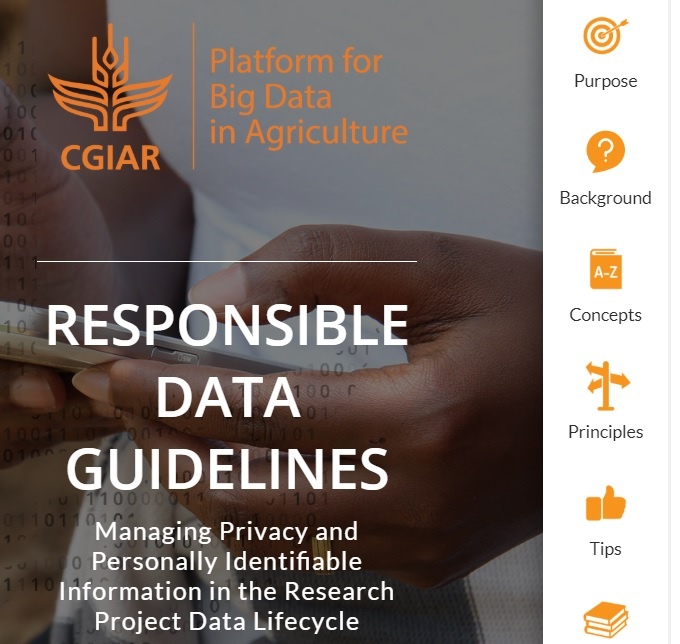RESPONSIBLE DATA GUIDELINES: Managing Privacy and Personally Identifiable Information
18/02/2019

“Data can be either useful or perfectly anonymous, but never both...” Paul Ohm – UCLA Law review 2010 57 UCLA L. Rev. 1701).

The CGIAR (the world's largest global agricultural innovation network) Team has published Responsible Data GUIDELINES: Managing Privacy and Personally Identifiable Information in the Research Project Data Lifecycle intended to assist agricultural researchers handle privacy and PII (personally identifiable information) in the research project data lifecycle.
|
These Guidelines are voluntary and aspirational in nature, intended as an aid for responsible decision making, not as a substitute for it. Agricultural Researchers need to be pragmatic in striking a balance between privacy protection and open data in order to maximize the benefits in agronomy and international development offered by the ‘big data revolution’, while minimizing the potential for social or personal harm. |
RESPONSIBLE DATA MANAGEMENT ON THE CGIAR PLATFORM FOR BIG DATA IN AGRICULTURE
The CGIAR Platform for Big Data in Agriculture:
- advocates open data for agricultural research for development and considers that opening up research data (on a FAIR basis; making data findable, accessible, interoperable and reusable) for scrutiny and reuse confers significant benefits to society. FAIR principles does not mean all research data should open since a broad range of legitimate circumstances may require data to be restricted;
- promotes responsible data management through the entire research data lifecycle from planning, collecting, storing, disclosing or publishing, transferring, discovery and archiving. This requires ongoing due diligence regarding legal, ethical and regulatory frameworks and disciplinary norms, in ways that maximize data trust and value, while minimizing risk.
To become familiar with key concepts around responsible data management such as:
- Personally identifiable information (PII)
- Research ethics
- Informed Consent
- Compliance
- Privacy by design and data minimization
- Privacy protection and data security
- Data subject rights
as welll as with 10 Guiding Principles designed to assist researchers throughout the Research Project Data Lifecycle and with do’s and don’ts concerning PII in the context of the Research Project Data Lifecycle that includes:
- PLANNING AND APPROVAL
- COLLECTION
- STORAGE & ANALYSIS
- REUSE / TRANSFER
- ARCHIVING / DISCARDING
- PUBLISHING & DISCOVERY
and real use-cases from Ag Data Transparent, The UK Anonymisation Decision-making Framework, Tool to Anonymize Data Containing Personally Identifiable Information available on CRAN repository, Building Ethics into Privacy Frameworks for Big Data and AI (Global Pulse),
YOU ARE INVITED TO ACCESS
|
These Guidelines are not meant to be exhaustive; so if you have other tips, resources, comments to add, please send comments to [email protected]. |
RESEARCH DATA- RELATED:
From debate about FAIR and Open Data to greater exploratory research, constructive discussions and solutions based on interoperable data in the agri-food and related sectors (highlights of the RDA IGAD outputs/recommendations)
- GDPR & What It Means For Researchers (recorded LIBER webinar, 2018)
- AgBioData ensures Standards and Best Practices for acquisition, display and retrieval of Genomic, Genetic & Breeding Data
- METADATA for Description, Discovery & Contextualisation. Check RDA METADATA Catalog
- Introduction to Data Ethics and the Data Ethics Canvas (ODI)
- RRI Tools: fostering Responsible Research and Innovation
- Data, Big data and Database Semantics (entry in ISKO Encyclopedia, 2018)
- Data Modeling Trends in 2019 (DataVersity)
- Copyright. Creative Commons. Sensitive information. Security Classification ... What is it all about?
- FAIRsharing : Find, Register, Claim your Standard, Database, and Policy... FAIRsharing will do the rest!
- Free E-learning Module: Finding Research Data
- Free GODAN_Action E-LEARNING PROGRAMME on open data management is ongoing to help strengthen the capacity of data producers and data consumers to manage and use open data in agriculture and nutrition
- Recorded ANDS FAIR Webinar series : #1 Findable #2 Accessible #3 Interoperable #4 Reusable
- Data Tree e-course [funded by the Natural Environment Research Council (NERC) through the National Productivity Investment Fund (NPIF), delivered by the Institute for Environmental Analytics and Stats4SD and supported by the Institute of Physics]
- Free e-lectures on Integrated Marine Observing System (IMOS) Marine DATA and SCIENCE
-
A list of training opportunities/resources on Research Data Management compiled by the US/RDA Education Effort
- Essentials 4 Data Support is an introductory course for those people who (want to) support researchers in storing, managing, archiving and sharing their research data
- Coursera Data Science e-learning
- Coursera Research Data Management and Sharing e-learning
- MANTRA - how to manage digital data as part of your research project
- MANTRA for Librarians
- Author Carpentry
- Data Carpentry
- Library Carpentry
- WDS Data & Services Training Resources
- Guidelines for Data Management Plan from SNSF : learning from each other
- Articulating the value of DATA with the Australian National Data Service (ANDS)
- Want to take WIPO's General e-Course on Intellectual Property? Enroll here – it’s free of charge
You are invited to Sign up for AIMS News, follow @AIMS_Community on Twitter... And, thanks again for your interest!
